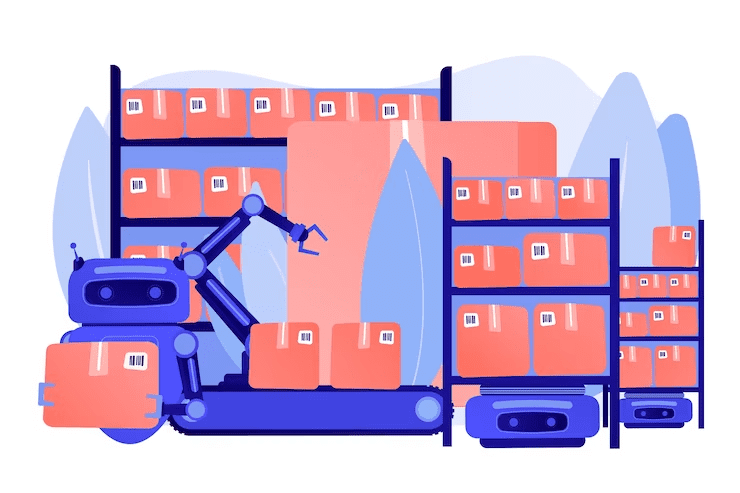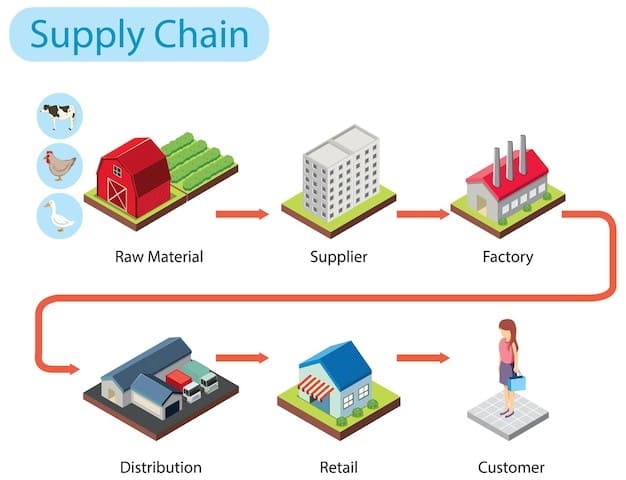
Supply chain management (SCM) is the process of coordinating the flow of goods and resources from suppliers to customers. AI is revolutionizing SCM by improving efficiency and reducing costs. In this blog post, we’ll explore how AI is transforming the supply chain management process. We’ll also discuss some of the benefits of using AI in SCM, such as improved decision-making, real-time visibility into the supply chain, and predictive analytics.
What is AI and how it is being used in supply chain management?

AI, or artificial intelligence, refers to the development of computer systems that can perform tasks that would typically require human intelligence, such as problem-solving, learning, and decision-making. In supply chain management, AI is being used to improve efficiency, reduce costs, and enhance decision-making.
Here are some examples of how AI is being used in supply chain management:
- Demand forecasting: is a critical function in supply chain management. Accurate forecasting allows companies to better plan their inventory levels, optimize production schedules, and ensure that products are available when customers need them. With AI, companies can analyze historical sales data, as well as external data such as weather patterns and economic indicators, to predict future demand for their products. By using this data to adjust production and inventory levels, companies can minimize costs associated with excess inventory or stock outs.
- Route optimization: is another area where AI can make a big impact. Delivery routes can be complex, with multiple stops, varying traffic patterns, and unpredictable delays. By using AI algorithms to analyze data on road conditions, traffic patterns, and delivery locations, companies can optimize their delivery schedules to reduce transportation costs and improve efficiency.
- Inventory management: is another key area where AI can be used to reduce costs and improve efficiency. By analyzing sales data and predicting future demand, AI algorithms can help companies optimize their inventory levels. This can reduce the amount of excess inventory, which can be costly to store and may become obsolete, and reduce stock outs, which can result in lost sales.
- Predictive maintenance:
- is an area where AI can be used to improve equipment reliability and reduce downtime. By monitoring equipment performance and analyzing data on factors such as temperature, pressure, and vibration, AI algorithms can predict when maintenance is needed. This can help companies avoid costly equipment failures and reduce repair costs.
- optimize supplier selection: By analyzing supplier data on factors such as delivery times, quality, and cost, AI algorithms can help companies make informed decisions about which suppliers to work with. This can help companies reduce costs and improve product quality by ensuring that they are working with reliable suppliers.
In summary, AI has a wide range of applications in supply chain management. By improving efficiency, reducing costs, and enhancing decision-making, AI can help companies stay competitive in today’s fast-paced business environment.
The benefits of using AI in supply chain management.
There are numerous benefits to incorporating AI into supply chain management processes. Some of the most significant advantages include:
- Improved efficiency: AI-powered systems can quickly analyze large amounts of data to identify patterns and potential issues. This can help streamline supply chain processes, from procurement to distribution, and reduce delays and errors.
- Reduced costs: By optimizing supply chain processes, AI can help reduce the costs associated with inventory management, transportation, and storage. Additionally, AI can help identify areas of waste or inefficiency, allowing companies to reduce costs and increase profitability.
- Enhanced visibility: AI can provide real-time visibility into supply chain operations, allowing companies to track inventory levels, monitor delivery times, and identify potential disruptions. This increased visibility can help companies make more informed decisions and respond quickly to changes in demand or supply.
- Improved forecasting: AI can analyze historical data and current trends to make accurate demand forecasts, allowing companies to optimize inventory levels and avoid overstocking or stockouts. This can help reduce inventory holding costs while ensuring that products are available when customers need them.
- Better risk management: AI can help identify potential risks in the supply chain, such as disruptions in transportation or supplier issues. By proactively addressing these risks, companies can mitigate their impact and reduce the likelihood of costly delays or disruptions.
Overall, incorporating AI into supply chain management can help companies operate more efficiently, reduce costs, and respond quickly to changes in demand or supply.
How AI is being used in specific areas of supply chain management, such as inventory control and order fulfillment.

AI is being used in various areas of supply chain management, including inventory control and order fulfillment. Here are some examples of how AI is being applied in these specific areas:
- Inventory control: AI can help optimize inventory levels by forecasting demand and adjusting inventory accordingly. AI algorithms can analyze past sales data, market trends, and external factors such as weather or economic conditions to make accurate predictions of future demand. This helps companies avoid stock outs or overstocking, which can lead to unnecessary costs.
- Order fulfillment: AI can help improve order fulfillment by automating order processing, reducing errors, and improving delivery times. AI-powered systems can analyze order data to determine the most efficient fulfillment strategy, such as optimizing picking routes or selecting the best carrier for each order. This helps companies reduce delivery times and increase customer satisfaction.
- Transportation management: AI can help optimize transportation management by providing real-time visibility into shipments, identifying potential disruptions, and optimizing transportation routes. AI algorithms can analyze data such as traffic patterns, weather, and carrier performance to determine the most efficient transportation route for each shipment. This helps companies reduce transportation costs and improve delivery times.
- Supplier management: AI can help improve supplier management by analyzing supplier performance data and identifying potential risks. AI algorithms can analyze data such as delivery times, quality issues, and pricing to determine the best suppliers for each product category. This helps companies reduce costs, improve product quality, and reduce the risk of supplier disruptions.
Overall, AI is being used in supply chain management to improve efficiency, reduce costs, and improve customer satisfaction. By automating manual processes and providing real-time visibility into supply chain operations, AI-powered systems can help companies respond quickly to changes in demand or supply and make more informed decisions.
Examples of companies that are using AI to improve their supply chain management
Many companies are using AI to improve their supply chain management. Here are a few examples:
- Walmart: Walmart is using AI to optimize its supply chain and reduce waste. The company uses machine learning algorithms to predict demand for products and optimize inventory levels. Walmart also uses drones to monitor inventory levels in its warehouses, which helps to improve accuracy and speed up the inventory process.
- Amazon: Amazon is using AI to improve its order fulfillment process. The company uses machine learning algorithms to predict which products customers are likely to buy, and it uses robots to move products around its warehouses. Amazon also uses AI to optimize its delivery routes, which helps to reduce delivery times and costs.
- DHL: DHL is using AI to optimize its logistics network. The company uses machine learning algorithms to analyze data on shipping routes, weather patterns, and other factors that can affect delivery times. DHL also uses robots to automate its warehouse operations, which helps to reduce costs and improve efficiency.
- Maersk: Maersk is using AI to improve its shipping operations. The company uses machine learning algorithms to predict when ships will arrive at port, which helps to reduce delays and improve scheduling. Maersk also uses blockchain technology to track the movement of goods through its supply chain, which helps to improve transparency and reduce fraud.
- UPS: UPS is using AI to optimize its package delivery process. The company uses machine learning algorithms to analyze data on delivery routes, package sizes, and other factors that can affect delivery times. UPS also uses drones to deliver packages in remote areas, which helps to improve delivery times and reduce costs.
These are just a few examples of companies that are using AI to improve their supply chain management. As AI technology continues to evolve, we can expect to see even more companies using AI to optimize their supply chains and gain a competitive edge.
Tips for businesses that are considering implementing AI into their supply chains

Here are some tips for businesses that are considering implementing AI into their own supply chains:
- Identify the areas of your supply chain that could benefit the most from AI: Before implementing AI, it’s important to identify the areas of your supply chain that could benefit the most from its implementation. This could include inventory management, demand forecasting, logistics optimization, and more.
- Start small and scale up gradually: Implementing AI can be a daunting task, so it’s best to start small and scale up gradually. This will help you to identify any issues or challenges early on and make adjustments before investing too much time and resources.
- Partner with the right AI vendor: When selecting an AI vendor, it’s important to partner with a reputable and experienced provider. Look for a vendor who has experience working with businesses in your industry, and who can provide you with the tools and support you need to successfully implement AI.
- Train your staff: It’s important to provide your staff with the necessary training to work with AI tools and technologies. This will help them to understand the benefits of AI and how to use it effectively in their daily work.
- Monitor and measure your results: As with any new technology, it’s important to monitor and measure your results to ensure that your implementation is achieving the desired outcomes. This will help you to identify areas for improvement and make adjustments as needed.
By following these tips, businesses can successfully implement AI into their supply chains, leading to improved efficiency, reduced costs, and increased competitiveness in their industry.
In conclusion:
In this blog post, we have discussed how AI is revolutionizing supply chain management. By utilizing AI, businesses can reap the rewards of improved efficiency and reduced costs. We also provided a look at how companies are already using AI in specific areas of their supply chains. From inventory control to order fulfillment and beyond, AI has become an integral part of many businesses’ success stories. Finally, we shared some tips for those interested in implementing AI into their supply chains.
By leveraging the power of big data and machine learning algorithms, companies have seen their operational costs fall from using an automated approach to managing their supply chain needs. With this newfound agility and scalability, organizations can be more responsive to shifts in market demand without wasting staff time or resources. With advances in automation technology over the last decade, it’s clear that AI has changed the game for supply chain management and looks set to continue its growth trajectory throughout the next decade.



Hello colleagues, good article and good arguments commented at
this place, I am actually enjoying by these.
Hello there! Would you mind if I share your blog with my twitter group?
There’s a lot of people that I think would really appreciate your content.
Please let me know. Thank you
Hi, after reading this amazing piece of writing i am as well happy to share my familiarity here
with colleagues.
Good way of describing, and fastidious post to get data on the topic of my presentation subject,
which i am going to present in university.